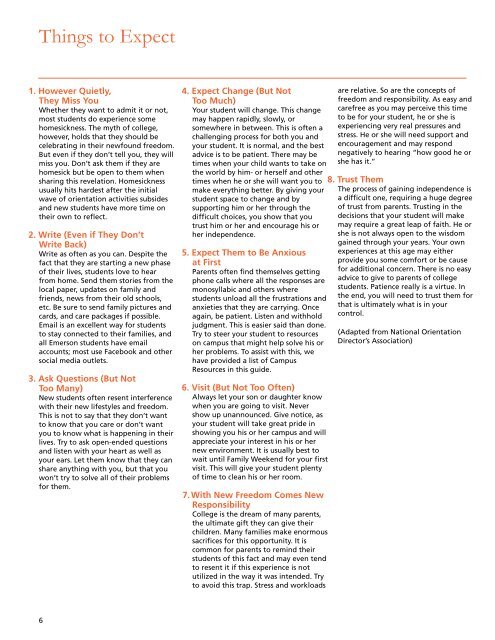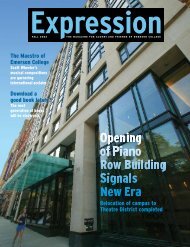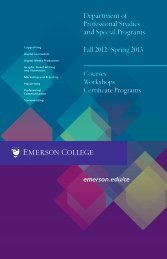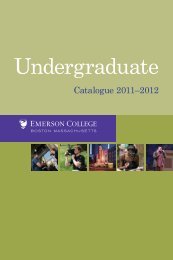Parent Resource Guide (PDF) - Emerson College
Parent Resource Guide (PDF) - Emerson College
Parent Resource Guide (PDF) - Emerson College
Create successful ePaper yourself
Turn your PDF publications into a flip-book with our unique Google optimized e-Paper software.
Things to Expect<br />
1. However Quietly,<br />
They Miss You<br />
Whether they want to admit it or not,<br />
most students do experience some<br />
homesickness. The myth of college,<br />
however, holds that they should be<br />
celebrating in their newfound freedom.<br />
But even if they don’t tell you, they will<br />
miss you. Don’t ask them if they are<br />
homesick but be open to them when<br />
sharing this revelation. Homesickness<br />
usually hits hardest after the initial<br />
wave of orientation activities subsides<br />
and new students have more time on<br />
their own to reflect.<br />
2. Write (Even if They Don’t<br />
Write Back)<br />
Write as often as you can. Despite the<br />
fact that they are starting a new phase<br />
of their lives, students love to hear<br />
from home. Send them stories from the<br />
local paper, updates on family and<br />
friends, news from their old schools,<br />
etc. Be sure to send family pictures and<br />
cards, and care packages if possible.<br />
Email is an excellent way for students<br />
to stay connected to their families, and<br />
all <strong>Emerson</strong> students have email<br />
accounts; most use Facebook and other<br />
social media outlets.<br />
3. Ask Questions (But Not<br />
Too Many)<br />
New students often resent interference<br />
with their new lifestyles and freedom.<br />
This is not to say that they don’t want<br />
to know that you care or don’t want<br />
you to know what is happening in their<br />
lives. Try to ask open-ended questions<br />
and listen with your heart as well as<br />
your ears. Let them know that they can<br />
share anything with you, but that you<br />
won’t try to solve all of their problems<br />
for them.<br />
6<br />
4. Expect Change (But Not<br />
Too Much)<br />
Your student will change. This change<br />
may happen rapidly, slowly, or<br />
somewhere in between. This is often a<br />
challenging process for both you and<br />
your student. It is normal, and the best<br />
advice is to be patient. There may be<br />
times when your child wants to take on<br />
the world by him- or herself and other<br />
times when he or she will want you to<br />
make everything better. By giving your<br />
student space to change and by<br />
supporting him or her through the<br />
difficult choices, you show that you<br />
trust him or her and encourage his or<br />
her independence.<br />
5. Expect Them to Be Anxious<br />
at First<br />
<strong>Parent</strong>s often find themselves getting<br />
phone calls where all the responses are<br />
monosyllabic and others where<br />
students unload all the frustrations and<br />
anxieties that they are carrying. Once<br />
again, be patient. Listen and withhold<br />
judgment. This is easier said than done.<br />
Try to steer your student to resources<br />
on campus that might help solve his or<br />
her problems. To assist with this, we<br />
have provided a list of Campus<br />
<strong>Resource</strong>s in this guide.<br />
6. Visit (But Not Too Often)<br />
Always let your son or daughter know<br />
when you are going to visit. Never<br />
show up unannounced. Give notice, as<br />
your student will take great pride in<br />
showing you his or her campus and will<br />
appreciate your interest in his or her<br />
new environment. It is usually best to<br />
wait until Family Weekend for your first<br />
visit. This will give your student plenty<br />
of time to clean his or her room.<br />
7. With New Freedom Comes New<br />
Responsibility<br />
<strong>College</strong> is the dream of many parents,<br />
the ultimate gift they can give their<br />
children. Many families make enormous<br />
sacrifices for this opportunity. It is<br />
common for parents to remind their<br />
students of this fact and may even tend<br />
to resent it if this experience is not<br />
utilized in the way it was intended. Try<br />
to avoid this trap. Stress and workloads<br />
are relative. So are the concepts of<br />
freedom and responsibility. As easy and<br />
carefree as you may perceive this time<br />
to be for your student, he or she is<br />
experiencing very real pressures and<br />
stress. He or she will need support and<br />
encouragement and may respond<br />
negatively to hearing “how good he or<br />
she has it.”<br />
8. Trust Them<br />
The process of gaining independence is<br />
a difficult one, requiring a huge degree<br />
of trust from parents. Trusting in the<br />
decisions that your student will make<br />
may require a great leap of faith. He or<br />
she is not always open to the wisdom<br />
gained through your years. Your own<br />
experiences at this age may either<br />
provide you some comfort or be cause<br />
for additional concern. There is no easy<br />
advice to give to parents of college<br />
students. Patience really is a virtue. In<br />
the end, you will need to trust them for<br />
that is ultimately what is in your<br />
control.<br />
(Adapted from National Orientation<br />
Director’s Association)















